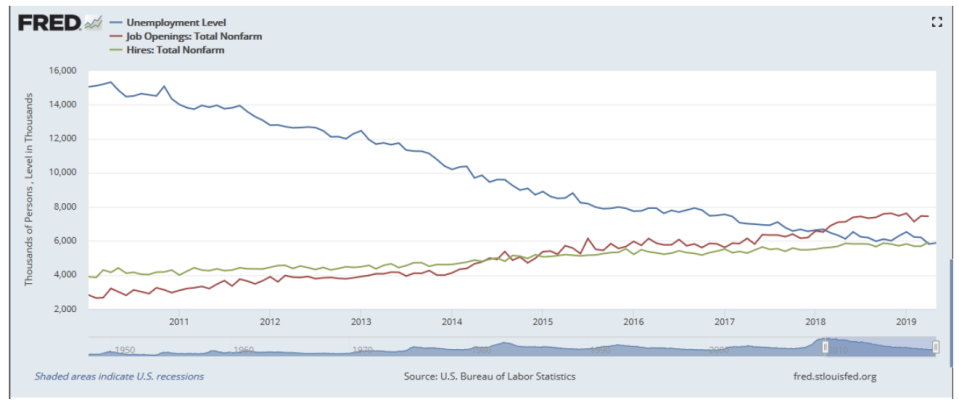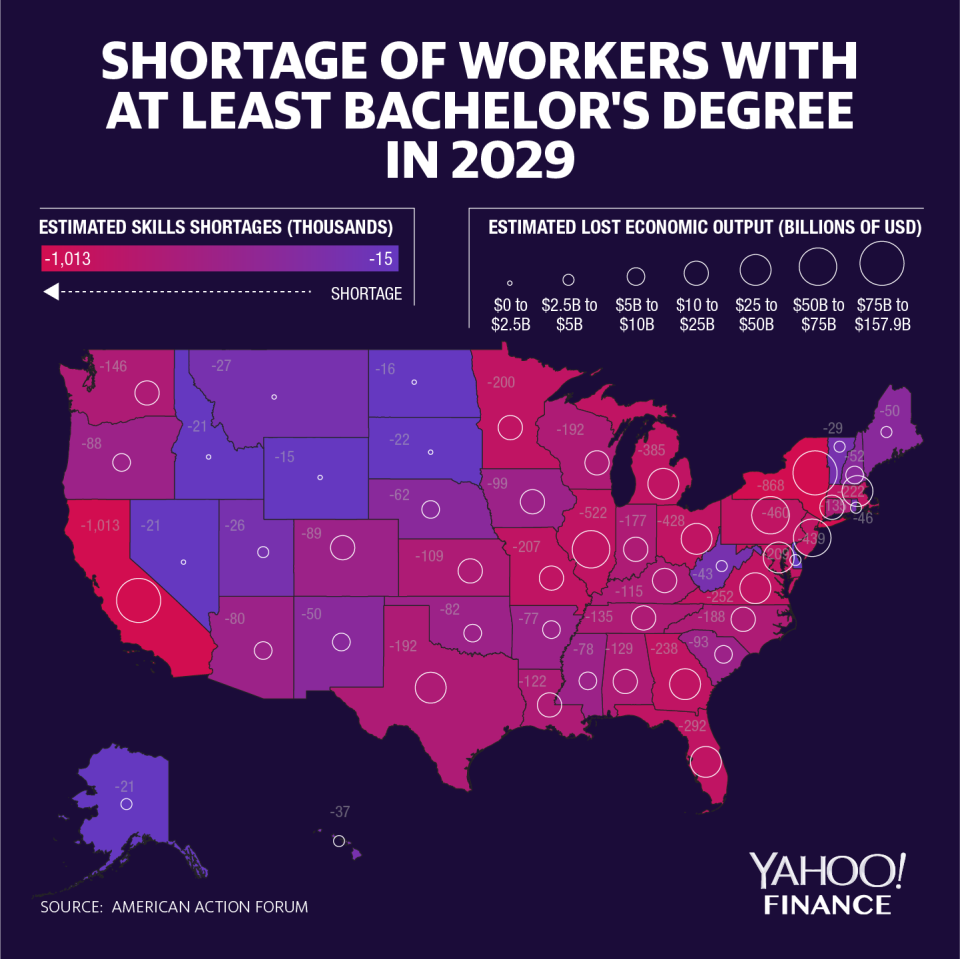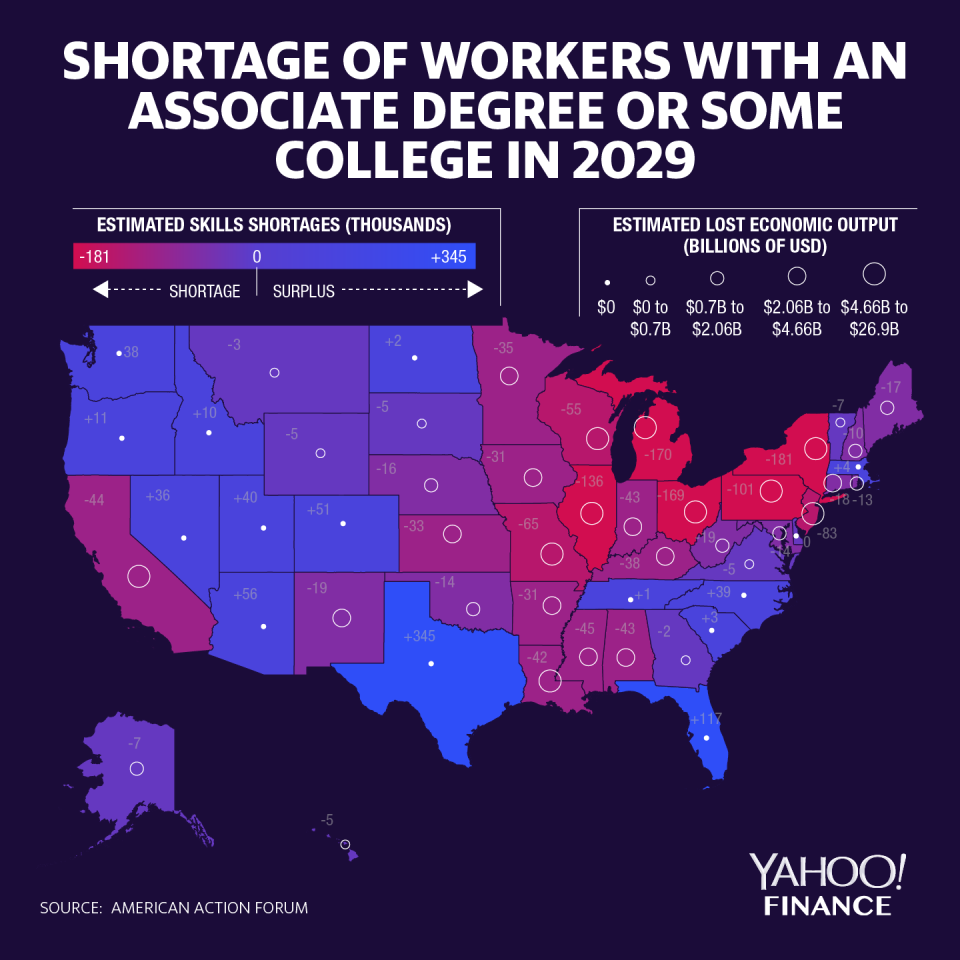Skills gap will cost US economy $1.2 trillion over the next decade
The shortage of workers with at least an associate or bachelor’s degree in the labor force will end up costing the U.S. economy $1.2 trillion over the next decade, according to a new report.
Education has historically had the power to unlock workers’ potential for better job opportunities and higher pay. With increased spending power, workers boost U.S. GDP. The skills gap in today’s labor market, however, is a threat to GDP growth over the next 10 years, according to American Action Forum (AAF), a center-right think tank.
Millions of job openings are left unfilled because employers can’t find suitable candidates. They’re having trouble attracting workers with needed skills that can be obtained through higher education (an associate’s or bachelor’s degree or higher). With unemployment at 3.7%, this is a growing concern for U.S. businesses: according to a recent report, 83% of employers say they are struggling to find workers with the right skills.

Demographic shifts are putting pressure on the labor market. As the workforce ages and labor force participation rates fall, employers will have access to a much smaller pool of workers relative to the size of the economy over the next decade, according to AAF.
Worker shortages

All 50 states will have a shortage of workers with at least a bachelor’s degree by 2029. California will face a deficit of over one million workers, while New York will have a shortage of 868,000 workers. For Illinois, the shortfall will reach 522,000.
Same goes for workers with associate degrees or some college, according to AAF. There will be a significant shortage of these workers in New York in 10 years (181,000), Ohio (169,000), and Michigan (170,000). States with the least amount of shortages include Montana (3,000), Wyoming (5,000), South Dakota (5,000). Delaware won’t have any worker shortages among those with at least an associate degree, says AAF.
There will actually be a surplus of workers with at least an associate degree in 15 states, including Texas (345,000), Florida (117,000), and Arizona (56,000).

In total, the U.S. will face a shortage of about 765,000 workers with skills gained from acquiring at least an associate degree or some college. There’s a shortfall of 8.62 million workers, among those with at least a bachelor’s degree. AAF estimates that these figures add up to about 5.6% of the estimated labor force in 10 years.
If left unaddressed, the AAF estimates these massive worker shortages will cost the U.S. $1.2 trillion in economic output.
The economic losses are most dramatic in states with severe shortages of workers with at least a bachelor’s degree, including California ($157.9 billion) and New York ($129 billion).
Skills in demand
President Trump’s administration has taken some measures to address the skills gap. The president signed an executive order last year aimed at helping millions of Americans obtain skills they need to find jobs. More than 15 companies, including Walmart (WMT), Microsoft (MSFT), and FedEx (FDX), joined the initiative and vowed to train workers.
Other companies are tackling the problem on their own. Capital One (COF), for instance, has offered thousands of its associates tech training as it seeks to offer customers ever-more interactive products while also guarding against online fraud.
“There is a high demand for everything from cloud computing to software engineering, machine learning, cyber security,” says Gill Haus, CTO for Digital at Capital One. “Finding people that have those skills, particularly as new skills are everyday evolving, that’s the gap that we’re working to address.”
More from Sibile:
Washington playing ‘high stakes poker game’ with Big Tech: Analyst
Trump hopes for trade deal even though ‘China is letting us down’
Why people with credit card debt are paying 18% more on everything
The more money you make, the harder it is to be on vacation: LinkedIn
Why Trump will likely reach a trade deal with China by the end of summer


